Amarok/Manual/AmarokWindow/Toolbar/fr: Difference between revisions
No edit summary |
Created page with "En utilisant les boutons légèrement transparents {{Icon|emblem-favorite}} et {{Icon|flag-green}} près du texte vous pouvez ajouter la chanson actuelle à vos pistes coups ..." |
||
| Line 32: | Line 32: | ||
qu'elles seront affichées. Plus d'informations sur la [[Special:myLanguage/Amarok/Manual/Various/Moodbar|Barre d'humeur]] plus loin. | qu'elles seront affichées. Plus d'informations sur la [[Special:myLanguage/Amarok/Manual/Various/Moodbar|Barre d'humeur]] plus loin. | ||
En utilisant les boutons légèrement transparents {{Icon|emblem-favorite}} et {{Icon|flag-green}} près du texte vous pouvez ajouter la chanson actuelle à | |||
vos pistes coups de coeur sur [http://www.last.fm/ last.fm] or add a position marker. | |||
On the right is the volume-control button. A blue circle around the button shows the current volume. The volume is 0 at the bottom and increases clockwise. Change volume by clicking on the volume circle or by using the scroll wheel while the mouse hovers the button. The sound can also be completely muted by clicking on the speaker in the center. | On the right is the volume-control button. A blue circle around the button shows the current volume. The volume is 0 at the bottom and increases clockwise. Change volume by clicking on the volume circle or by using the scroll wheel while the mouse hovers the button. The sound can also be completely muted by clicking on the speaker in the center. | ||
Revision as of 19:32, 19 January 2014
Barre d'outils
Introduction

La Barre d'outils est utilisée pour contrôler la lecture de la piste en train de jouer. Vous pouvez basculer de la barre d'outils principale à la barre d'outils compacte en utilisant le menu dans la Barre de menus. La barre de menu peut optionnellement être cachée ; utilisez le raccourci Ctrl + M pour la cacher ou l'afficher à nouveau.
La barre d'outils peut être déverrouillée et déplacée n'importe où sur vote écran, et même utilisée sans que le reste de la fenêtre d' Amarok ne soit affichée. Pour déverrouiller la barre d'outils, vous devez d'abord vous assurer que l'élément du menu ne soit pas coché. Maintenant vous pouvez saisir la barre d'outils sur son côté gauche et la glisser-déposer n'importe où. Pour retourner à sa position initiale, glissez-déposez-la où elle était à l'origine tant que la disposition reste déverrouillée.
Barre d'outils principale

Ceci est la barre d'outils par défaut. Elle possède un ![]() /
/ ![]() bouton sur la gauche et affiche le titre de la chanson, l'album et l'artiste en haut au centre.
bouton sur la gauche et affiche le titre de la chanson, l'album et l'artiste en haut au centre.
Les pistes précédente et suivante sont affichées de chaque côté du titre de la chanson actuelle. Cliquez sur l'une d'entre elles pour qu' Amarok interrompe la lecture de la piste courante et procède à la lecture de la piste précédente ou de la suivante.
Une barre de progression avec le temps d'écoute écoulé à gauche et le temps restant à droite affiche la position actuelle de l'écoute de la chanson. Si vous avec les Barres d'humeur activées, et les fichiers .mood pour vos pistes, c'est ici qu'elles seront affichées. Plus d'informations sur la Barre d'humeur plus loin.
En utilisant les boutons légèrement transparents ![]() et
et ![]() près du texte vous pouvez ajouter la chanson actuelle à
vos pistes coups de coeur sur last.fm or add a position marker.
près du texte vous pouvez ajouter la chanson actuelle à
vos pistes coups de coeur sur last.fm or add a position marker.
On the right is the volume-control button. A blue circle around the button shows the current volume. The volume is 0 at the bottom and increases clockwise. Change volume by clicking on the volume circle or by using the scroll wheel while the mouse hovers the button. The sound can also be completely muted by clicking on the speaker in the center.
Slim Toolbar

The Slim Toolbar has the same functionality as the Main Toolbar, but is more compact. Additionally the Slim Toolbar has a ![]() button to stop playing so the current song will be restarted when you press
button to stop playing so the current song will be restarted when you press ![]() again. All buttons concerning the current track are on the left and only the volume control on the right side. Here the volume is controlled by clicking on the button and dragging the slider or using the scroll wheel while the mouse is hovering the button.
again. All buttons concerning the current track are on the left and only the volume control on the right side. Here the volume is controlled by clicking on the button and dragging the slider or using the scroll wheel while the mouse is hovering the button.
